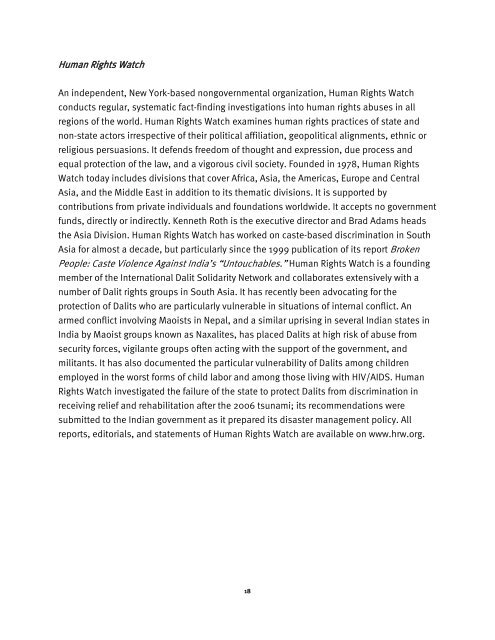Caste Discrimination against India's âUntouchablesâ - Human Rights ...
Caste Discrimination against India's âUntouchablesâ - Human Rights ...
Caste Discrimination against India's âUntouchablesâ - Human Rights ...
You also want an ePaper? Increase the reach of your titles
YUMPU automatically turns print PDFs into web optimized ePapers that Google loves.
<strong>Human</strong> <strong>Rights</strong> Watch<br />
An independent, New York-based nongovernmental organization, <strong>Human</strong> <strong>Rights</strong> Watch<br />
conducts regular, systematic fact-finding investigations into human rights abuses in all<br />
regions of the world. <strong>Human</strong> <strong>Rights</strong> Watch examines human rights practices of state and<br />
non-state actors irrespective of their political affiliation, geopolitical alignments, ethnic or<br />
religious persuasions. It defends freedom of thought and expression, due process and<br />
equal protection of the law, and a vigorous civil society. Founded in 1978, <strong>Human</strong> <strong>Rights</strong><br />
Watch today includes divisions that cover Africa, Asia, the Americas, Europe and Central<br />
Asia, and the Middle East in addition to its thematic divisions. It is supported by<br />
contributions from private individuals and foundations worldwide. It accepts no government<br />
funds, directly or indirectly. Kenneth Roth is the executive director and Brad Adams heads<br />
the Asia Division. <strong>Human</strong> <strong>Rights</strong> Watch has worked on caste-based discrimination in South<br />
Asia for almost a decade, but particularly since the 1999 publication of its report Broken<br />
People: <strong>Caste</strong> Violence Against India’s “Untouchables.” <strong>Human</strong> <strong>Rights</strong> Watch is a founding<br />
member of the International Dalit Solidarity Network and collaborates extensively with a<br />
number of Dalit rights groups in South Asia. It has recently been advocating for the<br />
protection of Dalits who are particularly vulnerable in situations of internal conflict. An<br />
armed conflict involving Maoists in Nepal, and a similar uprising in several Indian states in<br />
India by Maoist groups known as Naxalites, has placed Dalits at high risk of abuse from<br />
security forces, vigilante groups often acting with the support of the government, and<br />
militants. It has also documented the particular vulnerability of Dalits among children<br />
employed in the worst forms of child labor and among those living with HIV/AIDS. <strong>Human</strong><br />
<strong>Rights</strong> Watch investigated the failure of the state to protect Dalits from discrimination in<br />
receiving relief and rehabilitation after the 2006 tsunami; its recommendations were<br />
submitted to the Indian government as it prepared its disaster management policy. All<br />
reports, editorials, and statements of <strong>Human</strong> <strong>Rights</strong> Watch are available on www.hrw.org.<br />
18

















